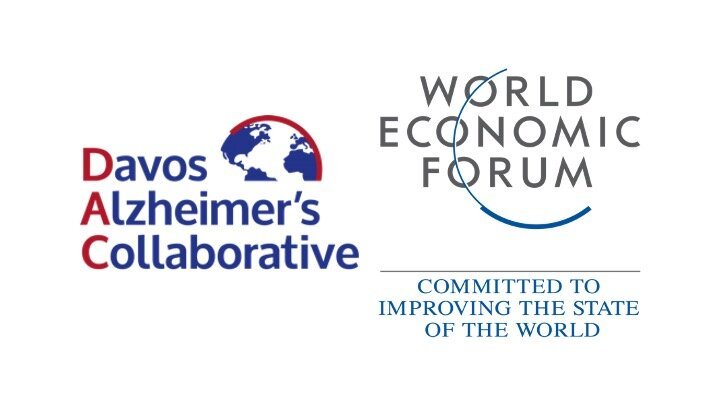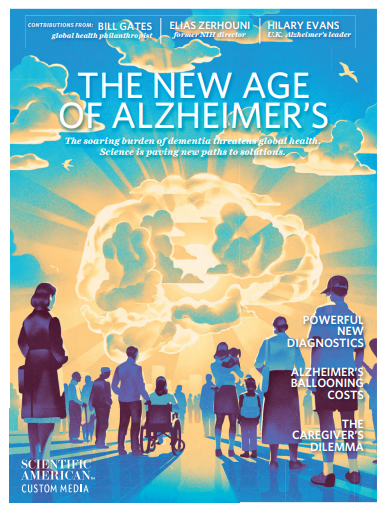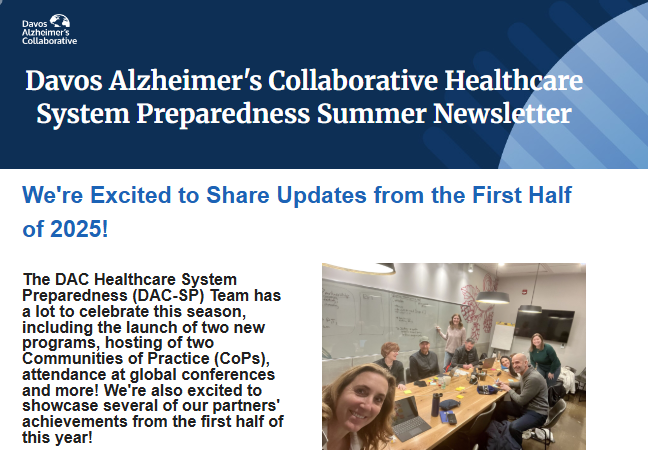
Healthcare System Preparedness
The DAC Healthcare System Preparedness (DAC-SP) program catalyzes global healthcare system transformation that allows patients and their families quicker access to life-changing innovations. Through implementation science, DAC-SP is evaluating global programs focused on increasing rates of cognitive screening, early detection, and accurate diagnosis of Alzheimer’s disease and related disorders. Learnings from these programs are synthesized into a practical, digital resources for healthcare systems to adopt best practices for patient care.
The Challenge
The incidence of Alzheimer’s disease is increasing, but healthcare systems are not prepared to meet today’s challenge, much less the coming surge.
The number of people living with Alzheimer’s is projected to triple from 55 million today to over 139 million by 2050.
Healthcare systems face significant challenges evaluating and adopting novel interventions in real-world practice. There is a 17- to 20-year gap between clinical innovations and widespread adoption, with less than 50% ever becoming part of real-world practice.
Sources: Alzheimer’s Disease International; Bauer & Kirchner (2020)
Our Approach
DAC-SP supports multiple, diverse implementation programs that drive sustainable healthcare system change.
DRIVING INNOVATION AND IMPLEMENTATION ACROSS THE PATIENT PATHWAY
DAC Healthcare System Preparedness Framework
Source: Ball et al, 2022 (See Figure 1)
The DAC-SP framework guides healthcare system transformation across the Alzheimer’s care continuum through ten measurable nodes where implementation programs may be targeted and evaluated. Its flexible design allows healthcare systems worldwide to adapt the framework and develop solutions tailored to system-specific priorities.
IMPLEMENTATION PROGRAMS
In 2021, DAC-SP launched the first implementation program focused on screening and early detection of cognitive impairment. Based on initial learnings, additional programs were created to expand early detection and address timely and accurate diagnosis.
See our DAC-SP Sizzle Reel here!
DAC Healthcare System Preparedness programs include 70 sites across 19 countries and 5 continents.
Early Detection Implementation Network
These programs focus on the DAC-SP framework node “Screening and Early Detection”. The aim of these programs is to improve the rate of early detection of cognitive impairment. Healthcare systems included in these programs represent geographically diverse populations within and across countries.
-
Aim: increase rate of early detection of cognitive impairment in primary care by implementing a digital cognitive assessment and a blood biomarker
Sites: 7 healthcare systems in 6 countries: Brazil, Jamaica, Japan, Mexico, Scotland and U.S.
-
Aim: locally designed projects to increase rate of early detection of cognitive impairment
Sites: 12 healthcare systems in 8 countries: Armenia, Brunei, Canada, Cuba, Germany, Japan, Kenya, and U.S.
-
Aim: implemented the DAC-SP Early Detection Blueprint to standardize early detection of cognitive impairment in primary care
Sites: 10 U.S. healthcare systems in 9 states: California, Georgia, Indiana, Massachusetts, New Jersey, New York, Pennsylvania, South Carolina, and Texas
-
Aim: co-created and implemented a BHN model to provide timely care for patients with cognitive decline in primary and specialty care settings
Sites: 6 U.S. healthcare systems in 5 states: California, Kentucky, Michigan, Ohio, Vermont
-
Aim: national initiative led by Dementias Platform UK to transform early detection by integrating digital cognitive tools into routine clinical care
Sites: 10 U.K. healthcare systems participating in the READ-OUT study
Accurate Diagnosis
These programs focus on the DAC-SP framework node “Timely and Accurate Diagnosis”. The primary aim of these global initiatives is to improve the timeliness and accuracy of an Alzheimer’s disease or related dementia (ADRD) diagnosis, by implementing appropriate cognitive assessments and biomarkers.
-
Aim: implement blood biomarkers and confirmatory Alzheimer’s pathology testing into primary and specialty care for timely and accurate diagnosis of ADRDs
Sites: 8 healthcare systems in 5 countries: Germany, Japan, Netherlands, UK, and U.S.
-
Aim: 5-year initiative to develop and deploy a modular toolbox platform that reduces barriers to timely detection and treatment of Alzheimer's disease by improving each step of the clinical pathway
Sites: 8 healthcare systems in 6 countries: Sweden, U.K., Netherlands, Italy, Finland, and Spain
LEARNING LABORATORY
The DAC Healthcare System Preparedness Learning Laboratory is a platform for leaders from government, healthcare, and industry across all resource settings to drive evidence-based changes to policy and practice. By fostering global collaboration and sharing learnings and insights from Alzheimer’s research and systems change initiatives aimed at common operational challenges, new innovations and approaches can be more effectively adopted by other communities and systems because Alzheimer’s patients and their families do not have years to wait for research to reach clinical practice.
To view our previously recorded Learning Laboratory meetings, please visit our YouTube channel.
SCIENTIFIC AMERICAN SPECIAL REPORT
Discover how science, innovation, and global collaboration are reshaping the fight against Alzheimer’s. This special report, created in 2024 in partnership with Scientific American Custom Media, explores breakthroughs in early detection, prevention, and care—and what they mean for the future of brain health in The New Age of Alzheimer's.
“If people are not being told they have dementia in the first place, it is really, really difficult for them to be channeled to the right services. And even when people do receive a diagnosis, in many cases healthcare providers and physicians are ill-equipped to actually point them to these services.”
・ Elina Suzuki ・
Advisor, Organisation for Economic Co-Operation and Development






